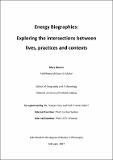| dc.description.abstract | Individual consumption and behaviour change has become a key area of attention in European and Irish sustainable development policy. To date, policy approaches to consumption have been informed by individualised models of behaviour that fail to appreciate the situated nature of action and how it changes over time. In this context, understandings of how and why people develop and maintain environmentally significant domestic energy practices remain inadequate.
While practice-theoretical approaches have made significant progress in advancing dynamic, contextual approaches to consumption research, the question of how dynamics play out in the context of individuals’ biographies has largely been overlooked. As a result, contextualised, biographic approaches to understanding energy practices have to date been under-theorised and under-researched. This thesis begins to address this lacuna. Drawing on practice-theoretical and socio-historic lifecourse concepts, it investigates how individuals’ everyday energy practices, including food, mobility and laundry practices, intersect and interact with processes of biographic and socio-technical change. Following recent innovations in the field, it is argued that qualitative reconstructive-biographic methods offer a holistic, contextual and experiential means of analysing processes that have hitherto been overlooked by deductive or temporally limited research designs. To this end, a multi-modal biographic-narrative methodology, incorporating a suite of qualitative narrative and lifecourse tools, was developed and employed to explore patterns and processes of practice at daily and life paths.
The findings from this study highlight the importance of situating consumption contextually in biographic and socio-technical contexts. They reveal that, rather than being driven solely by individual choice and deliberation, an individual’s action is strongly configured by context. Energy practices are patterned according to institutional and relational roles and commitments, with variance in modes and patterns of performance observed according to lifecourse circumstances, in particular, gender, age, employment status, and parenthood. The processes shaping dynamics are complex, operating at a range of interacting scales, from an individual’s emergence through the stages and phases of the gendered lifecourse, to the broader societal structures that frame this process. Engagement with energy is intricately bound up in continually evolving identities, roles, social contexts and relationships. Further, wider socio-technical developments, including technology, infrastructures, economic and policy advances, have intersected to steer individuals’ energy practice careers towards increasing resource intensity. The thesis concludes that these findings have important implications for policy, suggesting sustainable consumption requires a much more fundamental challenge to social contexts than is recognised by current individualised approaches.
This thesis makes a number of key contributions to the field of sustainable consumption research. Methodologically, by designing, implementing and testing an innovative biographic-practice methodology, it has contributed to methodological developments in practice-theoretical approaches. Empirically, by providing an in-depth account of patterns and processes affecting the formation of domestic energy practices in Ireland, this research has begun to address the lacuna in Irish-based consumption research as well as contributing to a growing body of contextualised, biographic approaches to consumption more broadly. Further, in applying a novel combination of practice-theoretical and socio-historic lifecourse concepts to the study of energy practices, this thesis advances theoretical debates in the rapidly expanding field of consumption and demand research. | en_IE |


